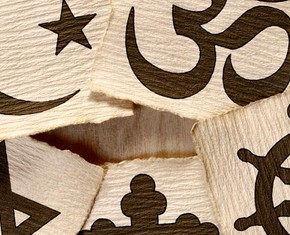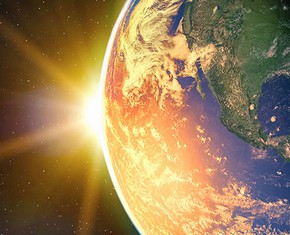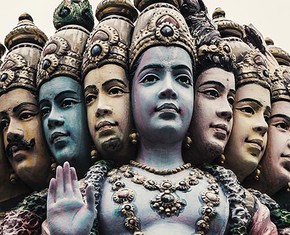The views expressed in our content reflect individual perspectives and do not represent the authoritative views of the Baha'i Faith.
When I first became interested in the Baha’i Faith, my initial attraction was to the principle that belief results not from blind acceptance of dogma but from independent investigation of truth.
Baha’u’llah, the prophet and founder of the Baha’i Faith, repeatedly asserts that the study of religion should not be the exclusive province of academics or theologians. He asserts that all of us are required to immerse ourselves in the ocean of holy scripture that we “may unravel its secrets, and discover all the pearls of wisdom that lie hid in its depths.” – The Most Holy Book, p. 85.
As an educator, I sensed in this exhortation an underlying wisdom about authentic learning—that the process of studying the holy texts requires the same rigor and systematic methodology with which I had approached my study of all other literature. Related to this realization was my increasing appreciation as a professor that education is not merely the acquisition of information. Authentic education is a process of helping others acquire tools for individual study.
In a similar vein, during my forty-three years of university teaching, I have come to appreciate how important it is to convey to my students the distinction between this idea of true learning and the commonly held notion that education is little more than the capacity to parrot information that someone else has discovered. The retention of the intellectual history of human thought has value, certainly, but it is the story of how someone else learned—it is not a substitute for our own ventures into the realm of creative thought, however much these stories can inspire us to attempt the same sort of quest.
In 1973, having been a Baha’i for thirteen years and a college professor for ten, I sensed one evening as I perused some of the words revealed by Baha’u’llah that at the heart of his exhortation that all become independent seekers after truth was a very personal challenge. I felt I was being called as an aspiring scholar and teacher to employ in my study of the Baha’i Faith and its texts the same critical principles and methodological tools I had found so valuable in learning to study and explicate Chaucer, Shakespeare, Milton, and Eliot. I further realized that with this same quality of study, I might be able to intuit some spiritual wisdom and insights as I became inspired by various passages in the vast corpus of Baha’i texts, even as I had as a child leafing through the Bible as a believing Christian—but without systematic study, I might fail to apprehend the unifying themes and subtle layers of meaning that dwell beneath the surface of scripture until I approached these texts as systematically and seriously as I had my other literary scholarship.
The idea was hardly profound, and yet it had taken ten years for it to penetrate my consciousness, for me to realize that a casual, periodic, and unsystematic approach to literature, which was at the very heart of my beliefs about reality, was no longer sufficient for me. My sincere belief that there is an underlying logic in the sometimes veiled, concealed, metaphorical, and symbolic language of the prophets further encouraged and excited me to pursue a study of scripture as literature.
On that same evening as I thumbed through the pages of Baha’u’llah’s Book of Certitude, something else occurred to me—something so obvious that I was stunned I had never considered the proposition so clearly before: If what I professed to believe was that this text and these words were from a divine intermediary, a messenger of God—Baha’u’llah—I could dare pose whatever question I desired, and, with sufficient study and effort, I could be assured that the answer would be there if I had sufficient patience and perseverance, and adequate wit to recognize the answer when it appeared before me. Indeed, I realized that this was precisely the process these same verses were asking me to do!
Tantalized by these realizations, I began that same night a project that so far has lasted over thirty years, a quest to discover what would be for me the most fascinating and enigmatic question I could conceive: If God is omnipotent and could have created us in whatever way He desired, why did He determine that it would be a good idea for essentially spiritual beings (human souls) to begin an eternal existence in an associative relationship with a physical body that operates in a physical reality?
If we’re essentially spiritual beings, why do we have bodies?
After all, according to the Baha’i statement of human purpose—and according to human purpose as described by most revealed religions—our goal is to become spiritual. Why, then, did this omnipotent Being not create us already the way He wanted us? Or even more to the point, if He wants us to take part in this process of becoming spiritual, why did He fashion us in such a way that we begin in an environment more suitable for that purpose instead of a reality that seems virtually calculated to deter or distract us from our inherent purpose?
In this way, I began an exploration related to this question of theodicy, which means God’s justice.
The fact is, I took great delight in thinking myself into corners, I suppose because I knew that with diligence and help from the vast ocean of Baha’u’llah’s writings, I could think my way out again. I studied and wrote about such subjects as the Baha’i concept of justice and the Baha’i concept of the afterlife.
For however often I reflect on the question that was bequeathed to me that night, I always find myself revising, revisiting, and re-visioning my thoughts about this strange physical classroom we share while we attempt to discover the rightful place of things material in our lives, and our rightful place in the eternal plan of God as He has revealed that plan through the successive messengers sent to educate us down through the ages, those concealed souls Who have sacrificed themselves that we might become increasingly human and humane.
Please join me in this series of BahaiTeachings essays as we explore the purpose of physical reality.
















Comments
Sign in or create an account
Continue with Googleor